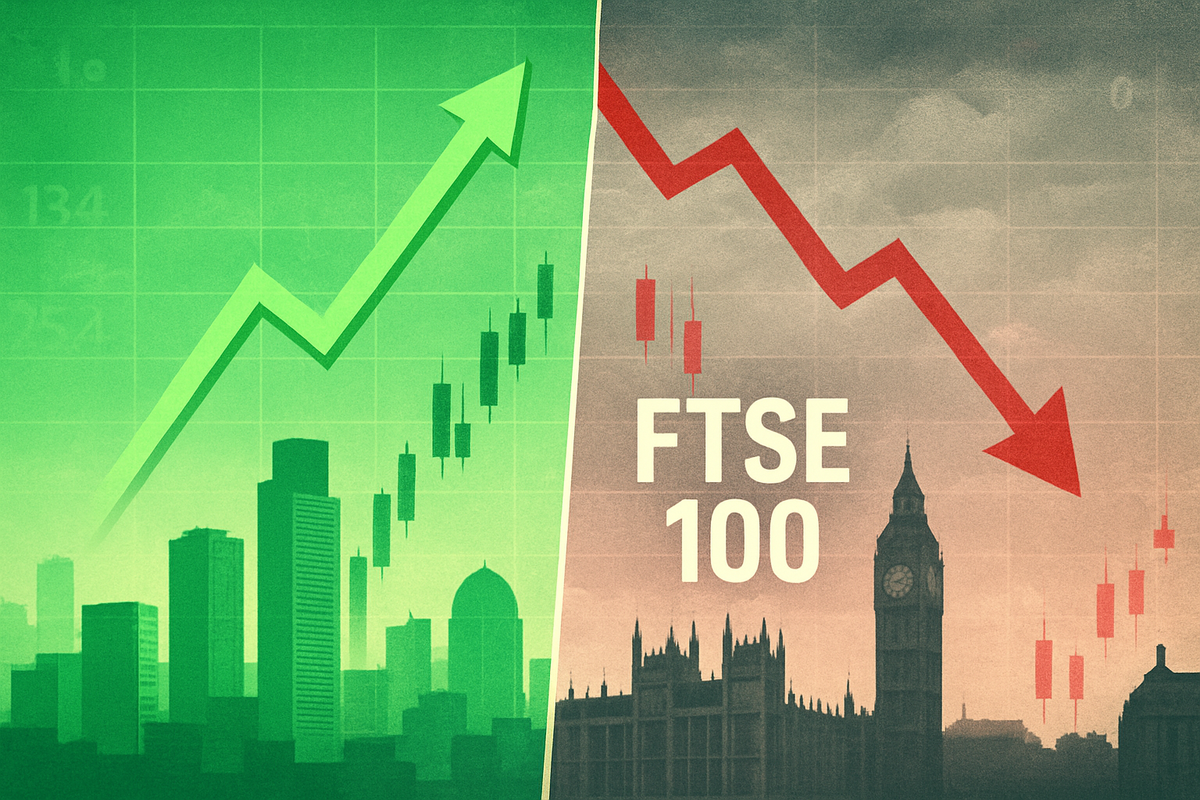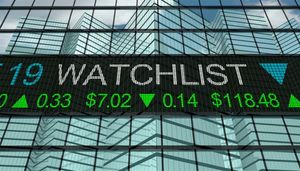
London, UK – October 27, 2025 – European financial markets today presented a tale of two distinct narratives, with a broad-based rally sweeping across the continent while London's venerable FTSE 100 index (LSE:UKX) conspicuously lagged behind. This divergence highlights underlying structural differences and specific headwinds impacting the UK's benchmark index, even as its continental counterparts celebrate gains fueled by renewed optimism and a robust global technology sector. The immediate implication for investors is a re-evaluation of regional allocations, as the UK market appears to be charting a unique, and currently less favorable, course.
The European Upswing vs. London's Drag
The broader European market rally on October 27, 2025, saw major indices across the Eurozone posting solid gains, buoyed by a combination of factors including positive economic data, easing geopolitical tensions, and a surging global technology sector. This widespread enthusiasm, however, failed to fully translate across the English Channel. The FTSE 100's underperformance can be attributed to a confluence of specific factors, most notably the significant drag from heavyweight financial institutions and its inherent sectoral composition. Shares of banking giant HSBC Holdings plc (LSE:HSBA) (NYSE: HSBC), a major component of the FTSE 100, were particularly subdued, weighing heavily on the index. The timeline leading up to this moment has seen a gradual shift in market dynamics, with technology and growth stocks increasingly dominating global investor sentiment. The FTSE 100, with its traditional heavy weighting towards financials, mining, and oil & gas, has found itself less exposed to this powerful global tech rally, leaving it vulnerable to underperformance when tech leads the charge. Key stakeholders involved include large institutional investors with significant holdings in both UK and European equities, as well as retail investors navigating these differing market conditions. Initial market reactions suggest a cautious re-assessment of UK-centric portfolios.
Companies Navigating the Crosscurrents
The divergent market performance creates clear winners and losers among public companies. On the losing side, financial behemoths like HSBC Holdings plc (LSE:HSBA) are feeling the pinch. As one of the largest constituents of the FTSE 100, any significant dip in HSBC's share price has a disproportionate impact on the entire index. Factors such as a challenging interest rate environment for traditional banking models, increased regulatory scrutiny, or specific company-related news could be contributing to its subdued performance. Other UK-focused financial institutions and companies within sectors less aligned with global growth trends, such as certain consumer staples or traditional industrials that constitute a large part of the FTSE 100, may also experience headwinds. Conversely, companies on the European continent with strong exposure to the technology sector, renewable energy, or innovative healthcare solutions are likely to be among the beneficiaries of the broader rally. For instance, major European tech firms or those with significant digital transformation initiatives would likely see increased investor interest, benefiting from the global tech upswing that the FTSE 100 is largely missing. This highlights a fundamental difference in the sectoral makeup and growth drivers between the UK and many continental European markets.
Wider Significance and Market Implications
This market divergence is not an isolated event but fits into broader industry trends that have been reshaping global financial landscapes for several years. Post-Brexit, the UK market has faced unique challenges, including potential shifts in trade relationships and investor sentiment, which may contribute to its distinct performance trajectory compared to the EU. The current situation underscores a global rotation towards growth and technology stocks, a trend that the FTSE 100, with its "old economy" heavyweights, is less equipped to capitalize on. This could have ripple effects on competitors and partners, as companies operating across both regions might see their valuations fluctuate differently based on their primary listing and sectoral exposure. Regulatory or policy implications could also emerge, particularly if the UK government or financial regulators perceive a need to stimulate growth in new sectors or encourage innovation to enhance the competitiveness of the London Stock Exchange (LSE). Historically, periods of market divergence often precede broader economic shifts or a re-evaluation of investment strategies, echoing past instances where certain regional markets have either led or lagged due to unique economic or political circumstances.
What Comes Next for European and UK Markets
Looking ahead, the short-term outlook suggests a continued scrutiny of the factors driving this divergence. Investors will be closely watching HSBC's performance and any sector-specific news impacting UK financials. In the long term, this situation could prompt strategic pivots for companies and investors alike. UK companies might need to accelerate their digital transformation efforts or explore diversification into higher-growth sectors to attract global capital. For investors, this presents both challenges and opportunities. The FTSE 100's underperformance might present value opportunities for contrarian investors seeking undervalued assets, assuming the underlying fundamentals of these companies remain sound. Conversely, the sustained rally in continental Europe could continue to draw capital towards growth-oriented sectors. Potential scenarios include a sustained period where the FTSE 100 underperforms until its sectoral composition evolves or global economic conditions favor its traditional strengths. Another scenario could see a correction in tech stocks, allowing the more value-oriented FTSE 100 to catch up, though this remains speculative.
A Crucial Juncture for UK Equities
In summary, today's market action highlights a significant divergence in the performance of European markets, with the FTSE 100 notably trailing a continent-wide rally. Key takeaways include the disproportionate impact of specific heavyweight stocks like HSBC (LSE:HSBA) and the FTSE 100's limited exposure to the burgeoning global technology sector. Moving forward, the market will likely assess whether this divergence is a temporary blip or indicative of a more fundamental shift in investor preferences and economic drivers. For investors, the coming months will be crucial for monitoring sector rotation trends, the performance of key financial institutions in the UK, and any policy initiatives aimed at bolstering the competitiveness of the London market. This moment serves as a critical reminder of the importance of understanding underlying market compositions and the diverse factors that can influence regional equity performance in an interconnected yet increasingly segmented global economy.
This content is intended for informational purposes only and is not financial advice





